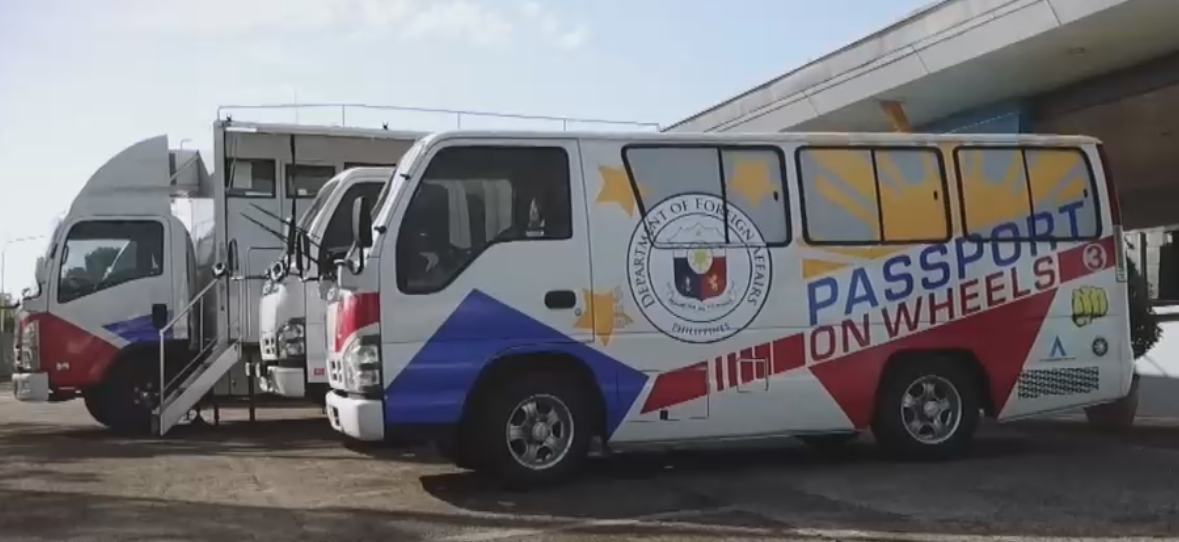by Juan Claudio S. Castro, PTV New Media
A passport is an international identification document used to enter different foreign territories. Crucial identity verification, be it within a person’s motherland or across the globe, entails the presentation of pivotal papers on individuality, among which is the passport. Due to the tedious, stringent processes of securing a passport, it is one of the most credible sources of identity man has ever crafted. With this high-stakes, never-no-brainer nature of the document, the Philippine government, in keeping with its overarching objective to provide the best possible living to the Filipino citizenry, undertakes a no joke, demanding, quite expensive, yet greatly rewarding pursuit—bringing the passport application and renewal sites to different communities across the Philippine archipelago. The state manifests this resounding commitment through the Passport on Wheels (POW).
The POW is a joint project of the Department of Foreign Affairs (DFA) and Asian Productivity Organization Production Unit, Inc. (APO) that provides the Philippine ePassport application and renewal closer to every Filipino in any part of the archipelago, especially in far-flung belts with a great deal of ease, a lot of time saved, and a considerable amount of money kept in the pocket. A project that began in January 15, 2018, the POW helps to decongest the regional and satellite sites of the DFA via deploying a caravan in different local government offices, malls, and other populous areas where a desire for the passport reverberates. The POW is the state’s response to the request of its constituents to have their own passport either for high stakes identification or foreign travel.
The POW, by the name itself, is the enrollment for, and delivery of, the passport with the help of wheels. Various vehicles dedicated to the project are rolled out to replicate the operations of the DFA offices through mobile operations. Eight vans, two of which are mega vans, house the heavy-duty equipment of the project, where each vehicle can accommodate 800 to 1,000 applicants a day. Said equipment is quite efficient in data gathering and storage.

Just like other successful pursuits out there, the POW began humbly: originally, a handful of vehicles carried out the undertaking. That said, limited number of Filipinos were attended—only 500 passport seekers per van a day.
The vigor of the POW has resulted in its ephemeral, yet satisfactory operations in the different parts of the country. The nearly-two-years-old passport service has gone to numerous islands, from the top of the Philippine geography down to less-heard, bottommost islands of the territory. “So, they’ve gone everywhere. They’ve gone to Batanes, to Jolo. They’ve been to Jolo. In fact, everywhere,” attests APO General Manager Alvin Reyes.
The Aklan province was one of those remote localities from the metropolis that wished to have a stake in the government’s innovative passport provision program. The Provincial Government of Aklan, through its Sangguniang Panlalawigan, with the helping hand of the governor and vice governor, responded to the impelling clarion call via seeking the conduct of the three-day POW operations in its jurisdiction for its constituents. As it turned out right in the preregistration phase, 2,000 residents were eager to enlist themselves in the innovative passport service of the national government.
As mentioned, the POW contemplates the convenient passport registration for the people. The ease of securing the passport is manifested by a three-step, easy-peasy process. First, the applicant undergoes the on-site preregistration where one fills out the necessary forms and submits them to APO’s staffers and the provincial government’s volunteers whom encode manually the information that said forms bear. Then, the passport seeker waits to be called for the next step. Once called, the applicant proceeds to the verification stage. Here, one presents to the staffer proofs of identity such as birth certificate and marriage document. Thereafter, the personnel members take the picture, biometrics, and other pertinent information of the applicant. The last step of the process is the payment of delivery fees. This entire process takes only 20 minutes if done in the priority lane. After less than a month, the 2,000 passport seekers receive their respective passport booklets in their houses.
“We think that by decentralizing, we reach more people. We serve them better, and most probably, lower the cost of printing for everybody else. Another evidence that the government is after the welfare of the people. Government goes to the people instead of the people go to the government,” Reyes explains.
The POW embodies the Philippine state’s earnest drive to serve its constituents, where the rubber hits the road. Keeping in mind the decisive, sometimes life-and-death importance of the passport in human existence, the government workforce is on its toes to ensure that every Filipino has his primary source of high stakes identification document. The fulfillment of the need comes not plainly. Comfort, snappiness, and frugality. These three mark the Philippine government’s service to Filipinos. These three brought about the Passport on Wheels.
